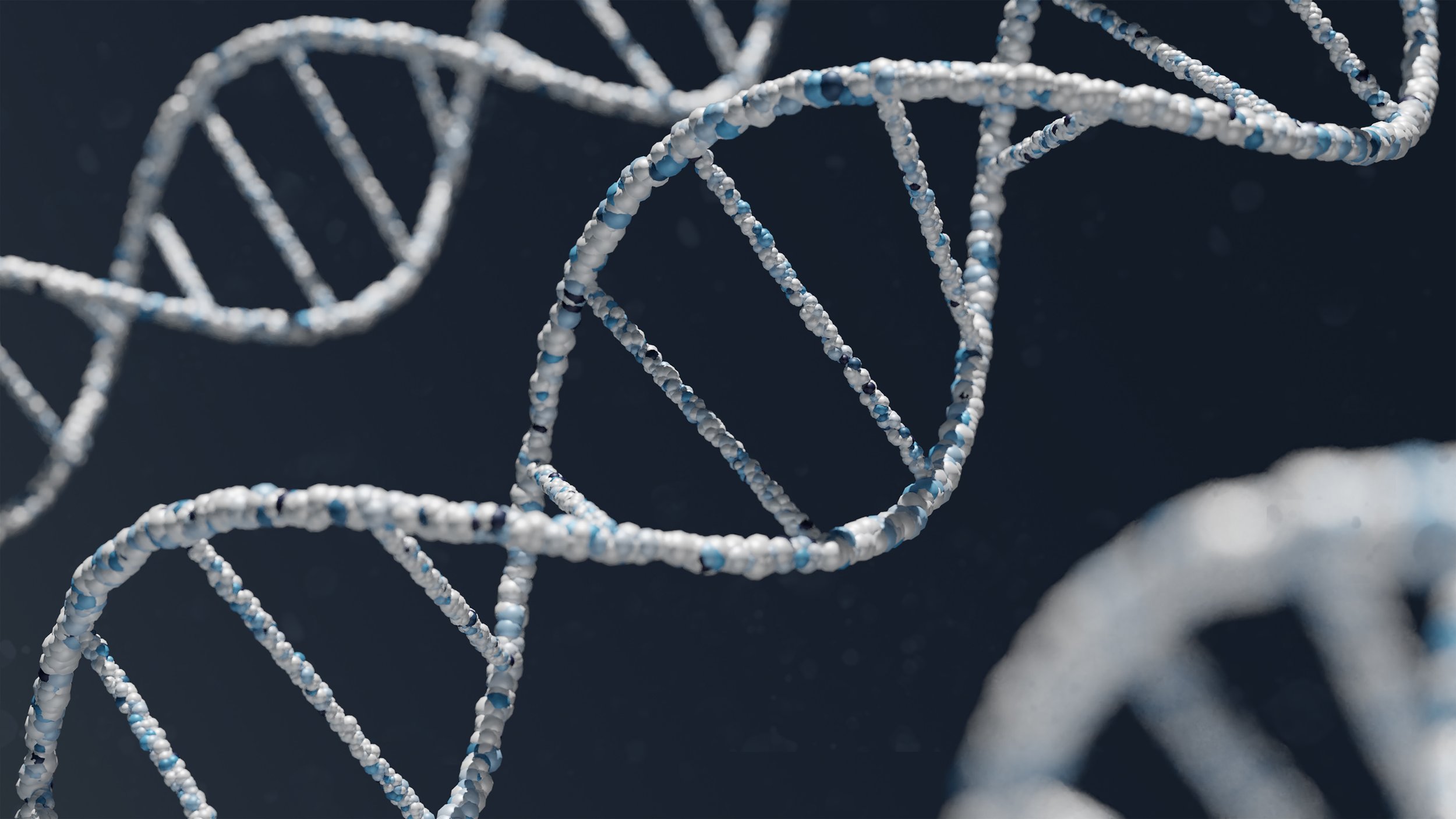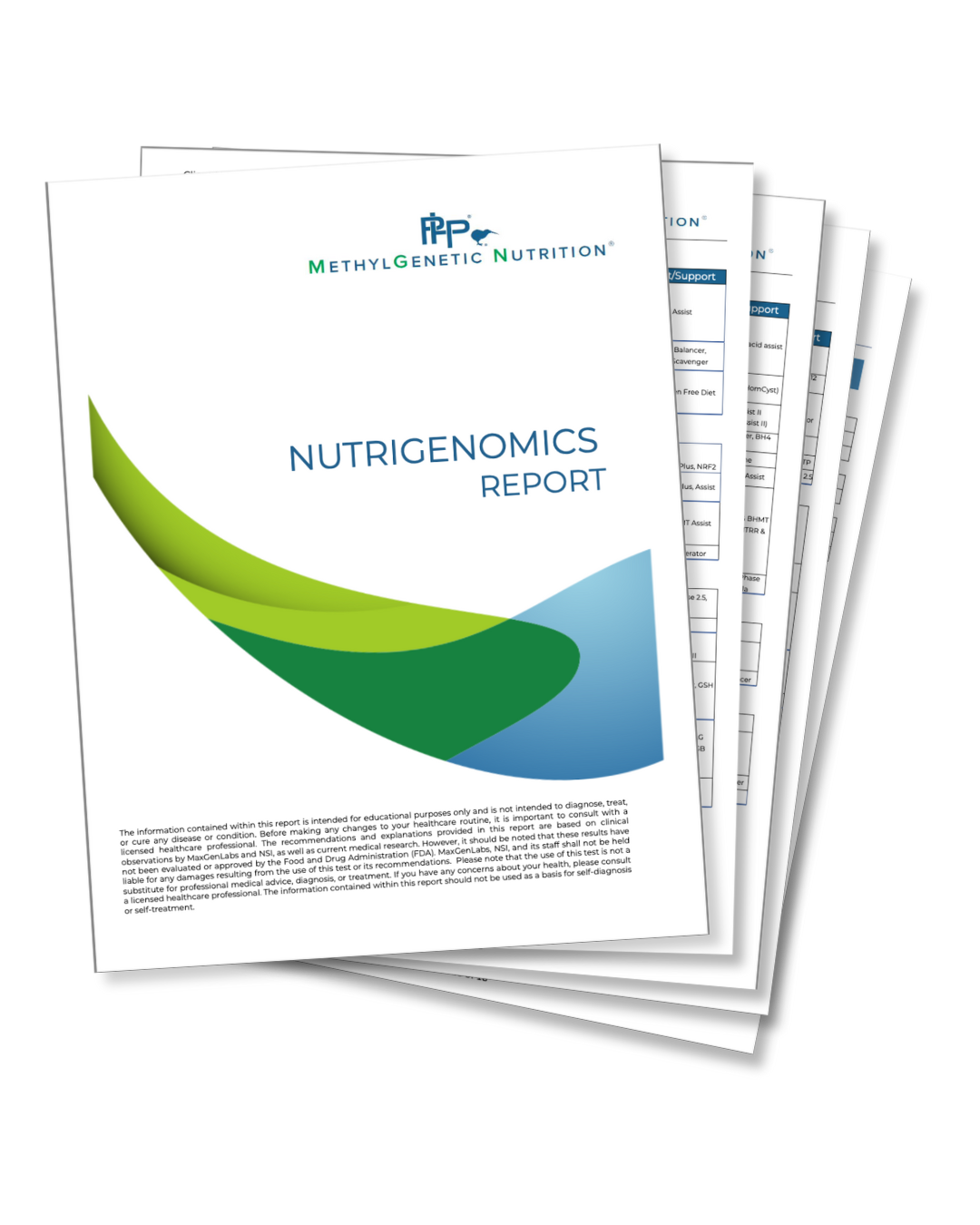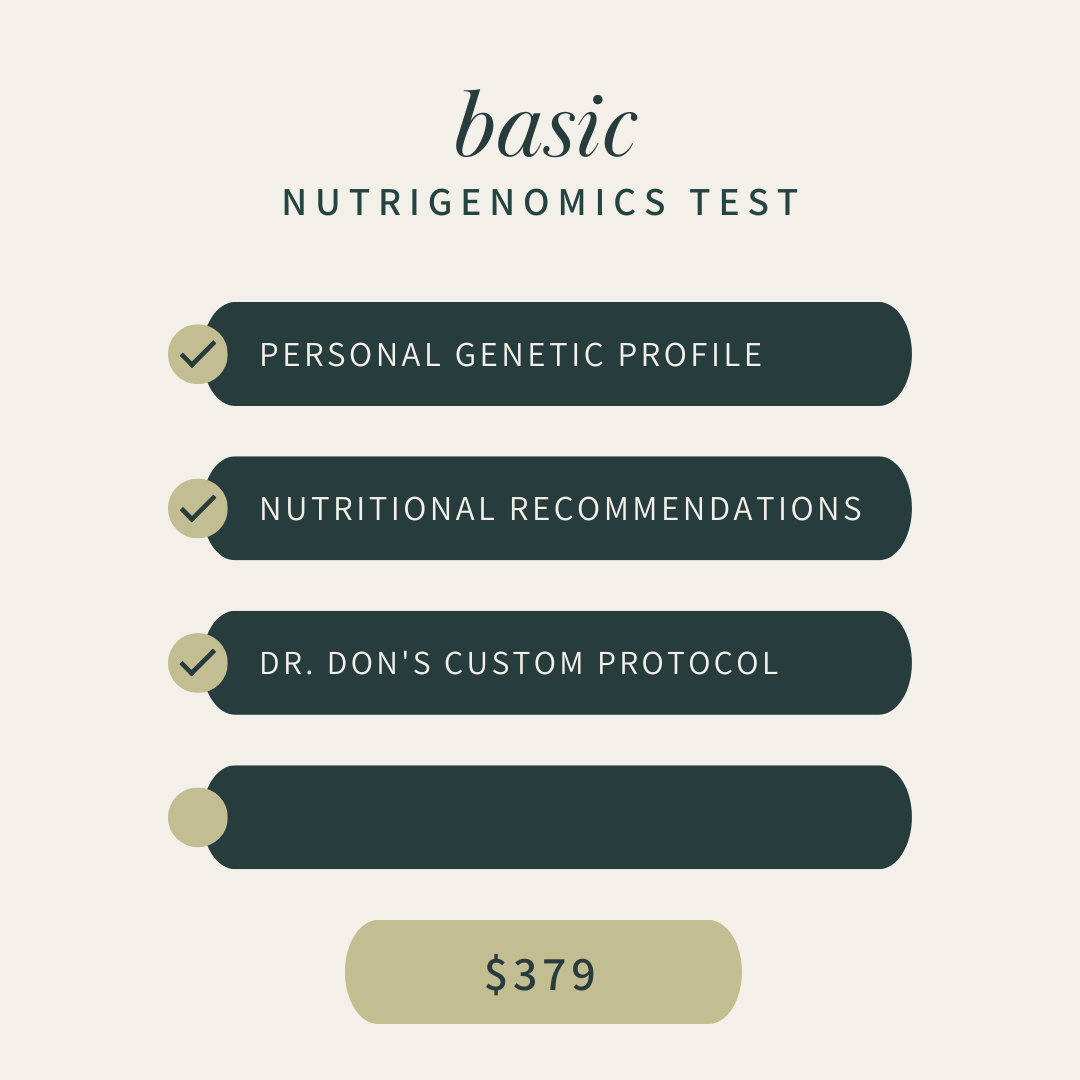
nutrigenomic
testing
Customized health plan based on your genes
What is Nutrigenomics?
Nutrigenomics is the study of how nutrition interacts with an individual's genetic makeup to affect health and disease. Nutrigenomics tests are laboratory tests that analyze specific genetic variations, called single nucleotide polymorphisms (SNPs), to provide personalized nutrition and lifestyle recommendations based on an individual's genetic profile.
Have you ever wondered
How my genes affect my health?
If I’m actually getting rid of toxins when I do a detox?
If something can help my anxiety, ADD, or depression?
Why my are allergies so bad?
If the supplements I’m taking are actually helping?
What foods are right for my body?
This test can answer those questions for you
Why discover your genetic makeup? Because your genes play a major role in how your body reacts to lifestyle choices and nutrition. It’s not a cure-all, but having this understanding will make a huge impact on your overall health.
This information gives you insight into your physiology and helps you make healthy choices that are right for your body. And it provides foundational information that you can base further testing on, if need be, because your genes never change. We can help with that too!
a Genetics test above the rest
Based on thorough research that found the specific genetic markers that are most applicable to optimal human health.
Identifies dysfunctions that prevent even the best nutrition from being put to use in your body.
Partnered with one of the top pharmaceutical grade supplement companies that has paired specific products to match deficiencies found on the testing.
Provides several alternatives to support the possible variations for each individual.
How it works
-

Test
Order your test kit and once you receive it, simply follow the instructions given and mail in the kit after collection.
-

Results
We will email you a breakdown of your genetic profile including signs and symptoms so you can understand what’s going on in your body at the most basic level.
-

Recommendations
You’ll receive system based nutritional and supplemental recommendations based on your genetic profile results.
What’s included in your results
-
This test will show if you have any allergies or sensitivities.
Histamines & your genetics:
Histamine is a chemical that is involved in many functions in the body, including immune response, digestion, and the regulation of blood flow. It is also a neurotransmitter, meaning it is used by the nervous system to communicate between cells.
When histamine is present in excess, however, it can cause a wide range of symptoms, including itching, flushing, hives, GI upset, and even anaphylaxis.
This condition is known as histamine intolerance, and it can be caused by a number of factors, including genetics, diet, environmental exposure, and certain medical conditions.
-
A person's genetic makeup can affect their blood sugar levels by influencing how their body processes and uses sugars from food.
Some genes can make people more likely to develop insulin resistance, a condition where the body doesn't use the hormone insulin properly, leading to high blood sugar levels.
Maintaining healthy blood sugar levels is crucial for good cardiovascular health, and understanding one's genetic predisposition can help in managing and preventing potential complications.
-
Elimination of toxins from the body is a critical process that helps to maintain overall health and prevention of certain diseases. The body has several systems for eliminating toxins, including the liver, kidneys, lungs, and skin, which work together to break down and remove harmful substances from the body.
The PON1 gene, short for paraoxonase 1, provides instructions to the liver enzyme PON1 to detoxify harmful substances and helps protect our body from oxidative stress and inflammation which can lead to various diseases.
Mutations in the PON1 gene can affect the activity of the enzyme PON1 reducing its efficiency in breaking down and removing toxins. A build up of toxins can increase a person's risk of type 2 diabetes, cardiovascular, and neuro- degenerative diseases.
Studies have also suggested that people with certain variations in the PON1 gene may be at a higher risk of developing certain neurological disorders such as Alzheimer's disease.
Having this genetic variation does not necessarily mean a person will develop diseases, however, individuals should work with their healthcare professional to take steps to reduce their risk by maintaining a healthy lifestyle, and avoiding environmental toxins.
-
Energy metabolism is the process by which the body converts food into energy that can be used by cells to carry out their functions.
Genes play a significant role in energy metabolism. Many genes are involved in the regulation of metabolism, including those that control the rate at which the body burns calories, the way the body stores fat, and the way the body responds to insulin.
-
Bile is a digestive fluid produced by the liver and stored in the gallbladder.
Maintaining healthy bile flow contributes to the prevention of diseases related to toxin accumulation, liver dysfunction, and impaired digestion.
Genetic mutations affecting the synthesis, transport, or regulation of bile components, such as bile salts or cholesterol, can contribute to abnormal bile flow or composition.
-
Specific genetic variations can significantly impact an individual's mental health, as they influence the expression of certain genes linked to mental health disorders, such as depression, anxiety, and Alzheimer's disease.
These variations may alter the function of neurotransmitters, brain structure, or neural connectivity, affecting an individual's susceptibility to these conditions.
It is essential to note that while genetic factors play a role, environmental factors and personal experiences also contribute to the development and progression of mental health disorders
-
Inflammation can be acute or chronic, and while acute inflammation is necessary and beneficial, chronic inflammation can contribute to the development of various diseases.
The superoxide dismutase (SOD) enzyme is an important antioxidant enzyme that plays a crucial role in the body's defense against oxidative stress.
Deficiencies or mutations in the genes encoding for SOD can lead to an increased susceptibility to cellular damage from oxidative stress, resulting in a variety of diseases such as Alzheimer's disease, and other neurodegenerative disorders.
-
Genetic variations in individuals can influence their ability to absorb and process different nutrients as they relate to nutrient metabolism, transport, and utilization.
These genetic differences can affect the efficiency of specific enzymes or transporters, leading to varying nutrient requirements or responses to dietary interventions among individuals.
Tailoring dietary supplements and vitamins to individual genetic profiles can help optimize nutrient intake and support overall health.
Custom protocol from dr. don
Plus, you’ll get a
You’ll get access to our professional dispensary and a full recommendation list based on your individualized genetic profile, including several alternatives to support possible variations. Dr. Don will assess your results and create an initial protocol.
You also have the option to add on a 30 minute consultation with Dr. Don, virtually or in person, to go over your test results.
From there, if you want further testing and support, you can schedule an appointment to become a patient with us.
Test Packages
interested in becoming a patient with us?
Our Services
-
Chiropractic Care

-
Functional Medicine

-
Nutritional Medicine





